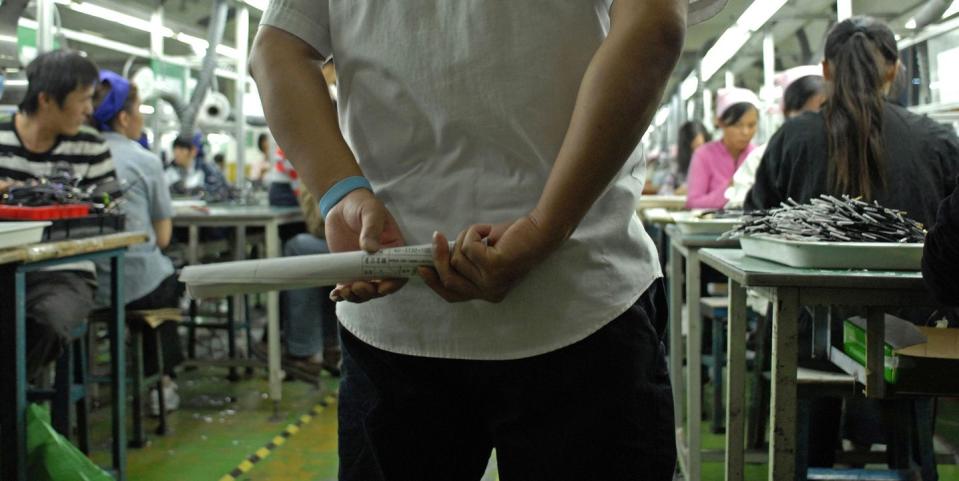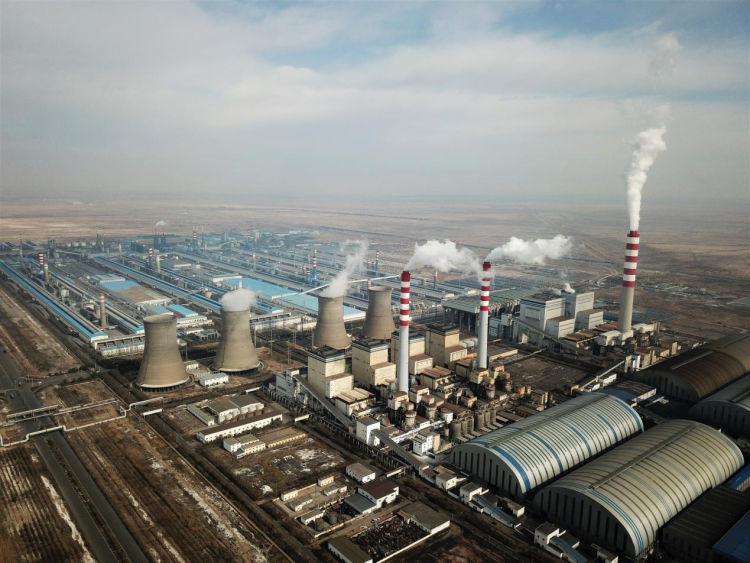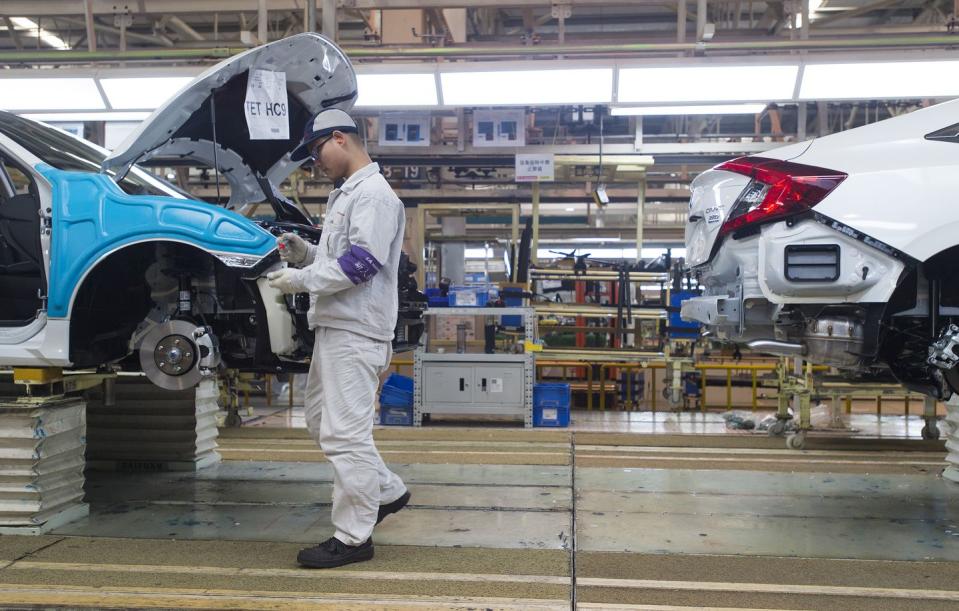Report Alleges Chinese Forced Labor in the Automotive Supply Chain

A report alleges the Chinese government uses forced labor to control its Uyghur population and points out how the global automotive industry may benefit.
Identified in the report are 50 international automotive parts or car manufacturers sourcing directly from companies operating in the Uyghur Region.
Automakers have responded cautiously, all pointing to codes of conduct to which they expect their suppliers to adhere.
A British report released this month has landed with a heavy thud on the doorsteps of the world’s automakers. From a team at Britain’s Sheffield Hallam University headed by Laura T. Murphy, professor of human rights and contemporary slavery at the school’s Helena Kennedy Centre for International Justice, it is both a deep dive into the Chinese government’s reported use of forced labor to control a Muslim minority and a meticulously documented account of how automakers might have complicity in (and benefits from) what amounts to slave labor in their long supply chains.
The report painfully recalled the revelations of German automakers making use of slave labor in World War II. Among the automakers accused in those operations: Audi, Volkswagen, BMW, Daimler-Benz, and even Ford and General Motors (through their German subsidiaries).
In response to the Sheffield Hallam report, automakers have been quick to brandish their codes of conduct for suppliers—which not surprisingly ban the use of coerced labor. The question remains, however, do automakers follow through with actual on-the-ground factory floor inspections that ensure the codes are being followed? Some say they do. With others, it’s not clear.
There are an estimated 12.8 million Uyghurs, a Turkic ethnic group—one of 55 minority groups in the country, centered in the Xinjiang Uyghur Autonomous Region in Northwest China. According to the BBC, “Human rights groups believe China has detained more than one million Uyghurs against their will over the past few years in a large network of what the state calls ‘re-education camps,’ and sentenced hundreds of thousands to prison terms… Recent decades have seen a mass migration of Han Chinese (China’s ethnic majority) into Xinjiang, allegedly orchestrated by the state to dilute the minority population there.”

China denies the allegations of forced labor in Xinjiang. According to the official Chinese Xinhua news agency, reporting last year on talks between the US and China in Alaska, “The claim that there is genocide in China’s Xinjiang is the biggest lie of the century, said the Chinese delegation…China will not accept any investigation in Xinjiang based on the presumption of guilt by those who are biased and condescending, and who want to lecture China, it said.”
The British report says the US received a quarter ($11.5 billion) of the $45 billion in Chinese auto parts production in 2021. It also said research had identified “more than 50 international automotive parts or car manufacturers (or their joint ventures) that are sourcing directly from companies’ operating in the Uyghur Region or from companies that have accepted Uyghur labor transfers across China.”
The latter point is important, because coerced workers have reportedly been transferred out of the Uyghur Region to factories across China. “There is substantial information regarding automotive electronics companies outside the Uyghur Region that are benefiting from the state-sponsored labor transfers of Uyghur people,” the report said.
Murphy told Autoweek, “The auto industry has a lot of work to do to extract supply chains out of the Uyghur Region. This is because the Chinese government has deliberately moved automotive manufacturing, renewable manufacturing, and raw materials processing out to that region.” She added that automakers should not only use their economic leverage to ensure that the products they’re buying aren’t made in that region, but should also “be collaborating to put pressure on companies in the rest of China that are accepting Uyghurs transferred by the state to work in factories that make auto parts.”

Carmakers have responded cautiously to the report’s findings. In an interview, Carlos Tavares, CEO of Stellantis, told Autoweek, “None of our suppliers would prevent us from visiting their facilities, but we have a lot of suppliers in Tiers 1 to 4, and 100 car models at Stellantis. We have a code of conduct to which we expect our suppliers to adhere, but it would be foolish to expect us to have visited them all the way through Tier 4. We are expecting all our suppliers to adhere to the guidelines.” Asked about the claims, other automakers gave the following responses:
Ford’s Anderson Chan provided guidelines that require suppliers to “confirm that work is conducted on a voluntary basis.” The use of “bonded, indentured, or exploitive prison labor” is prohibited.
General Motors’ David Barnas supplied a Dec. 9 statement: “We actively monitor our global supply chain and conduct extensive due diligence, particularly where we identify or are made aware of potential violations of the law, our agreements, or our policies.” GM’s Code of Conduct prohibits harassment and discrimination, slave and forced labor, human trafficking, or interfering with the right to collective bargaining.
Honda’s Chris Abbruzzese pointed to the company’s Global Sustainability Guidelines for suppliers but added, “We do not discuss our specific supplier relationships.”
Mark Gillies of Volkswagen said the company rejects “forced labor and all forms of modern slavery including human trafficking. This includes work carried out involuntarily by people due to intimidation, penalty, or threat of being disadvantaged.” VW has a Code of Conduct for Business Partners. The code specifically excludes child labor, human trafficking, and slavery. Gillies said allegations are immediately investigated via a grievance process. “Serious violations such as forced labor could result in termination of the contract with the supplier if mitigation measures fail,” Gillies said. In June, VW denied reports of forced labor at the jointly operated SAIC plant in Xinjiang. Former VW Group CEO Herbert Diess told 60 Minutes he was “absolutely sure” there was no forced labor at the plant.
Andrea A. Berg, a Mercedes-Benz spokeswoman, said: “Mercedes-Benz has no direct operations in the mentioned region. Mercedes-Benz seeks to ensure that its products contain only materials that have been mined or produced without violating human rights or environmental standards. Mercedes-Benz regularly makes spot checks with its suppliers in China and other countries.” The company maintains a set of Supplier Sustainability Standards for component producers.
Parts made whole or partly in Xinjiang are subject to the US Uyghur Forced Labor Prevention Act, which allows them to be seized at the port of entry. The law was signed by President Biden in December 2021. The US Department of Labor explains the basis of the law. “The People’s Republic of China has arbitrarily detained more than one million Uyghurs and other mostly Muslim minorities in China’s far western Xinjiang Uyghur Autonomous Region,” the Labor Department said. “It is estimated that 100,000 Uyghurs may be worked in conditions of forced labor following detention in re-education camps.”
According to the New York Times, US customs officials have intercepted approximately 2200 shipments, valued at more than $728 million, that may have had Xinjiang content. Of these, 300 products were released into the US.
The United Auto Workers responded to the Sheffield Hallam report by urging the auto industry “to shift its entire supply chain out of the region and invest in good paying jobs in the US to help meet its supply chain demands.”
The Uyghurs are hardly the only Chinese minority that has reportedly been the subject of forced labor. In 2013, a letter tucked into a packet of Halloween decorations sold at an Oregon Kmart read in part, “Sir: If you occasionally buy this product, please kindly resend this letter to the World Human Right Organization. Thousands people here who are under the persecution of the Chinese Communist Party Government will thank and remember you forever.” The letter was traced to a 47-year-old man—a former labor camp inmate, who was a member of the outlawed Falun Gong spiritual group.
Xinjiang is also a major source for the lithium-ion battery packs used in electric cars, and the minerals that go into them, which means the focus on the troubled region is likely to continue as the world electrifies.
Have thoughts on this story? Please leave your comments below.

 Yahoo Autos
Yahoo Autos 